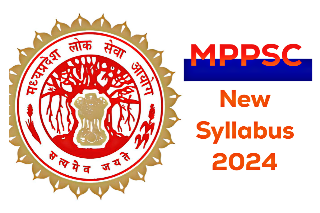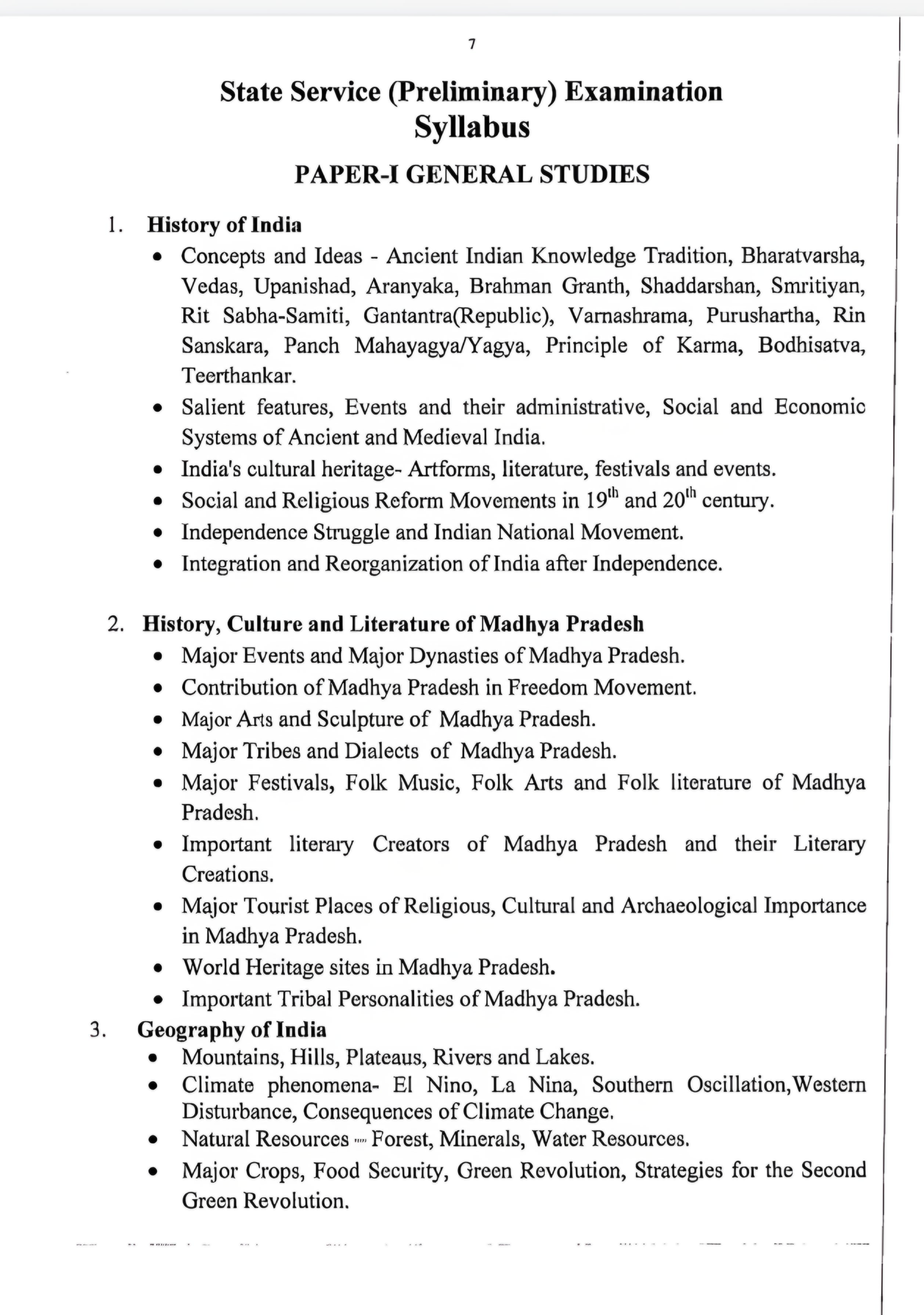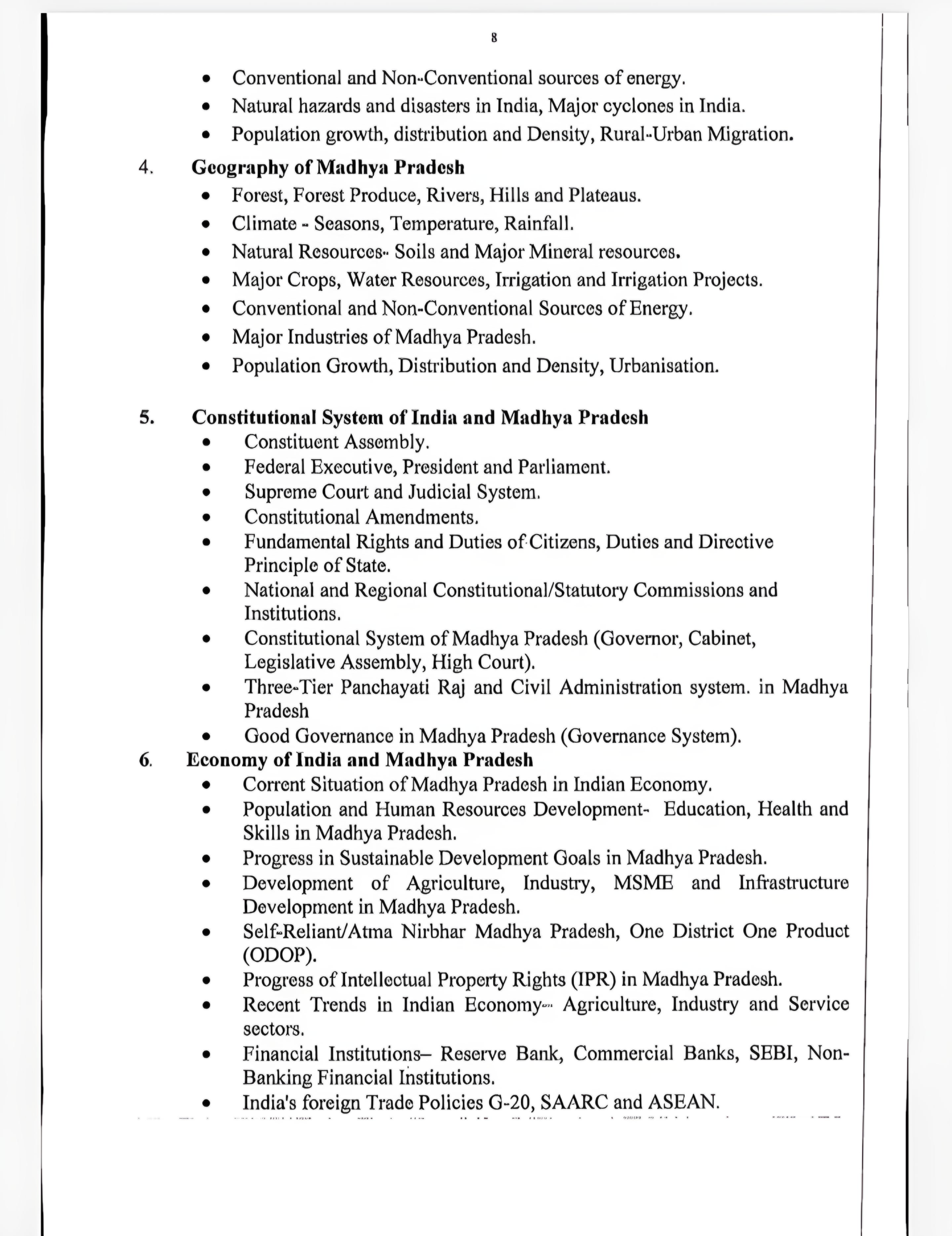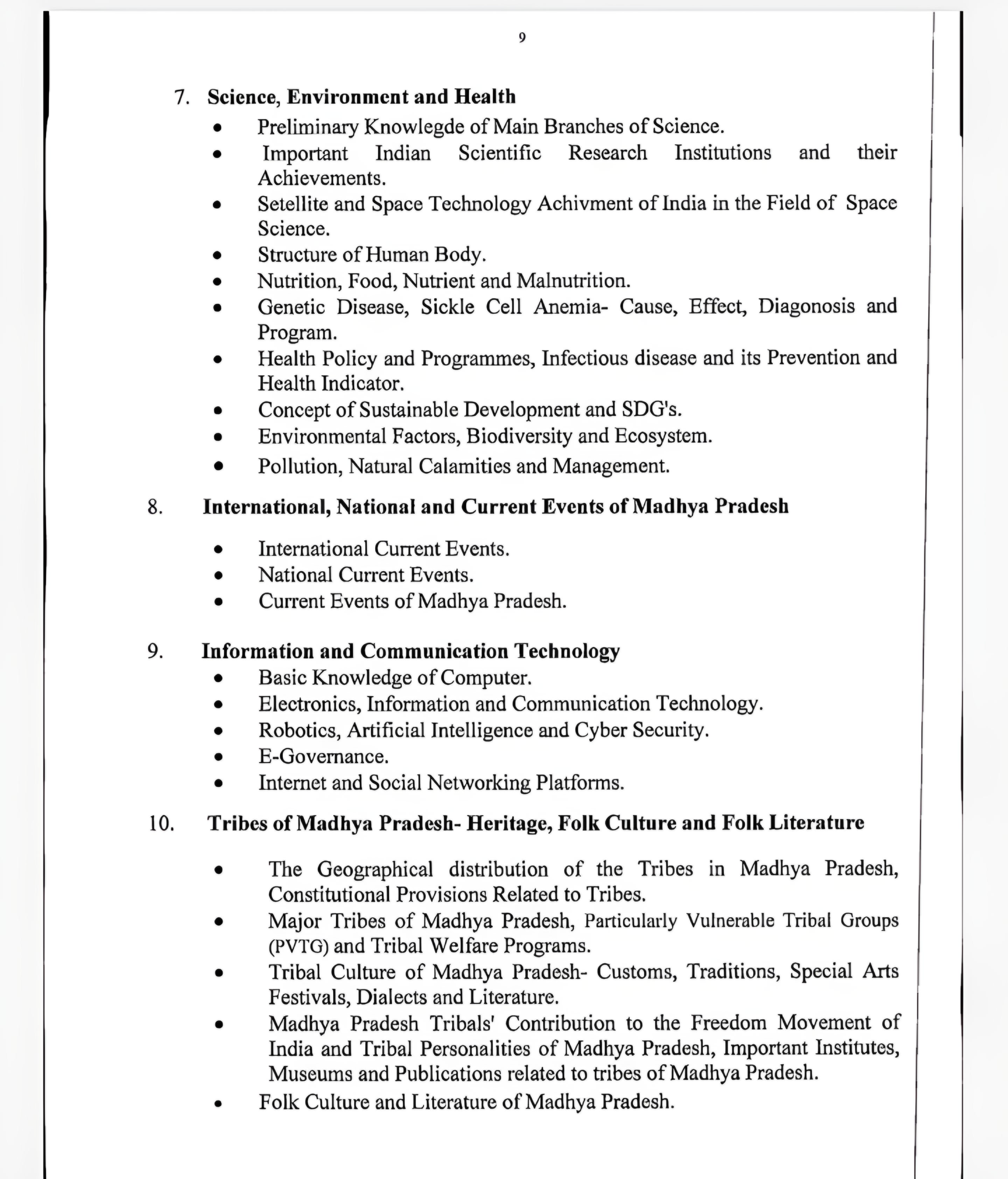You mppsc aspirants must be aware that MPPSC has recently made changes in its 2204 syllabus. In which article you will be able to know all the changes made by MPPSC in its syllabus. We have not made any changes in this syllabus. Whatever changes have been made by the official website of MPPSC, you will see them in this article.
MPPSC Syllabus 2024 in English
MPPSC has recently made changes in syllabus in 2024 in Unit 1, Unit 2, Unit 3, Unit 4, Unit 5, Unit 6 7 and Unit 10
MPPSC UNIT-1 : History of India
1. Concepts and Ideas – Ancient Indian Knowledge Tradition, Bharatvarsha, Vedas, Upanishad, Aranyaka, Brahman Granth, Shaddarshan, Smritiyan, Rit Sabha-Samiti, Gantantra (Republic), Varnashrama, Purushartha, Rin Sanskara, Panch Mahayagya/Yagya, Principle of Karma, Bodhisatva, Teerthankar.
2. Salient features, Events and their administrative, Social and Economic Systems of Ancient and Medieval India.
3. India’s cultural heritage- Artforms, literature, festivals and events.
4. Social and Religious Reform Movements in 19th and 20th century.
5. Independence Struggle and Indian National Movement.
6. Integration and Reorganization of India after Independence
Unit – 2. History, Culture and Literature of Madhya Pradesh
1. Important events in the history of Madhya Pradesh, major dynasties.
2. Contribution of Madhya Pradesh in the freedom movement.
3.Major art and architecture of Madhya Pradesh.
4. Major tribes of Madhya Pradesh and their dialects.
5. Major festivals, folk music, folk arts and folk literature of Madhya Pradesh.
6. Prominent litterateurs of Madhya Pradesh and their works.
7. Major religious, cultural and archaeological tourist places of Madhya Pradesh.
8. World Heritage Site in Madhya Pradesh.
9. Prominent tribal personalities of Madhya Pradesh
History, Culture and Literature of Madhya Pradesh
1. Major Events and Major Dynasties of Madhya Pradesh.
2. Contribution of Madhya Pradesh in Freedom Movement.
3. Major Arts and Sculpture of Madhya Pradesh.
4. Major Tribes and Dialects of Madhya Pradesh.
5. Major Festivals, Folk Music, Folk Arts and Folk literature of Madhya Pradesh.
6. Important literary Creators of Madhya Pradesh and their Literary Creations.
7. Major Tourist Places of Religious, Cultural and Archaeological Importance in Madhya Pradesh.
8. World Heritage sites in Madhya Pradesh.
9. Important Tribal Personalities of Madhya Pradesh.
Unit – 3. Geography of India
1. Mountains, hills, plateaus, rivers and lakes.
2. Climate phenomena- El Nino, La Nina, Southern Oscillation, Western Disturbance, consequences of climate change.
3. Natural resources forests, minerals, water resources.
4. Major crops, food security, green revolution, strategies for second green revolution.
5. Conventional and non-conventional sources of energy.
6. Natural hazards and disasters in India, major cyclones in India.
7. Population growth, distribution and density, rural-urban migration.
Unit – 4 Geography of Madhya Pradesh
1. Forests, forest produce, rivers, hills and plateaus.
2. Climate Seasons, temperature, rainfall.
3. Natural resources: Soils, major mineral resources.
4. Major crops, water resources, irrigation and irrigation
Projects.
5. Conventional and non-conventional sources of energy.
6. Major industries of Madhya Pradesh.
7. Population growth, distribution and density, urbanization.
Unit – 5. Constitutional system of India and Madhya Pradesh
1. constituent Assembly.
2. Federal Executive, President and Parliament.
3. Supreme Court and judicial system.
4. constitutional amendment .
5. Fundamental rights, duties of citizens and of the state Directive principles.
6. National and Regional Constitutional/Statutory Commissions and
Institutions.
7. Constitutional system of Madhya Pradesh (Governor, Cabinet,
Assembly, High Court).
8. Three-tier Panchayati Raj and urban administration in Madhya Pradesh
Arrangement
9. Good governance (governance system) in Madhya Pradesh.
Unit – 6 Economy of India and Madhya Pradesh
1. Current position of Madhya Pradesh in the Indian economy.
2. Development of population and human resources of Madhya Pradesh
Education, health and skills.
3. Madhya Pradesh’s progress in sustainable development goals.
4. Agriculture, Industry, MSME in Madhya Pradesh. And
Development of infrastructure.
5. Self-reliant Madhya Pradesh, one district, one product
(ODOP).
6. Intellectual Property Rights (IPR) in Madhya Pradesh
Progress .
7. New trends of Indian economy- agriculture, industry
And service sector. Banks, SEBI, Non Banking Financial Institutions.
8. Financial Institutions- Reserve Bank, Commercial
9 Of India Foreign trade policies and G-20, SAARC and ASEAN
Unit – 7. Science, Environment and Health
1. Elementary knowledge of major branches of science.
2. Major scientific institutions of India and their achievements.
3. In the field of satellite and space technology, space science
Achievements of India.
4. Human body structure.
5. Nutrition, diet, nutrients and malnutrition.
6. Genetic diseases, sickle cell anemia causes, effects,
Diagnosis and program.
7. Health policies and programmes, infectious diseases, their prevention
And health indicators.
8. Concept of sustainable development and SDG.
9. Environmental factors, ecosystems and biodiversity
10. Pollution, natural disasters and management.
Unit – 8. International, National and Madhya Pradesh current events
1. International current events.
2. National current events.
3. Current events of Madhya Pradesh.
Unit – 9. Information and Communication Technology
1. Basic knowledge of computer.
2. Electronics, Information and Communication Technology.
3. Robotics, Artificial Intelligence and Cyber Security.
4. E-governance.
5. Internet and social networking platforms.
Unit – 10. Tribes of Madhya Pradesh – Heritage, Folk Culture and Folk Literature
1. Geographical expansion of tribes in Madhya Pradesh,
Constitutional provisions relating to tribes.
2. Major tribes of Madhya Pradesh, special backward
Tribes and nomadic castes, welfare of tribes
Plans for.
3. Tribal cultural traditions of Madhya Pradesh, special
Arts, festivals, celebrations, language, dialect and literature.
4. India’s independence movement of the tribes of Madhya Pradesh
Contribution and prominent tribal personalities of the state.
Major institutions related to tribes in Madhya Pradesh,
Museum, Publications.
5. Folk culture and folk literature of Madhya Pradesh
How to download MPPSC new syllabus 2024 ?
Dawonlod Mppsc 2024 New Syllabus
Ans: First of all you have to go to the official website of MPPSC and click on the syllabus. As soon as you click, you will see the syllabus of various exams issued by MPPSC. You have to click on the syllabus of MPPSC 2024 and the PDF will be downloaded from there. Click. automatically as soon as you do it
State Service Examination is completed in three stages
1. Phase I – State Service Preliminary Examination (Objective Questions OMR Sheet Based)
2. In the second stage -State Service Main Examination (Written Descriptive).
3. Step Three – Interview
What type of questions are asked in MPPSC preliminary exam?
Ans: Multiple choice question
If there is any objection to any question, the committee will consider the objections and take action as follows:
1. For those questions for which wrong answer has been given from the options given in the provisional answer key and other options are correct, then the provisional answer key will be revised.
2. In case of difference between Hindi and English translation of the question, only the Hindi translation will be valid.
3. For questions which have more than one correct answer among the given options, all correct answers will be considered.
4. Those questions which do not have even one correct answer in the given options will be deleted from the question paper.
5. After considering all the representations by the Subject Expert Committee, the final answer key will be prepared and will be published by the Commission on the website https://mppsc.mp.gov.in.
Will be published on. No objection/correspondence will be accepted after the prescribed period of 05 days. The decision of the subject expert committee will be final and universally accepted.
6. After the test as above, all the candidates appearing in the question paper will be given full marks for the questions deleted by the committee.



